MOSCOW — On the eve of Orthodox Easter for the past 12 centuries, candles placed by the Church of the Holy Sepulchre in Old Jerusalem light up by themselves, an annual miracle shoring up faith with material evidence.
Or so the believers say.
The ancient mystery of the "Holy Fire" has risen to great prominence in the Russian Orthodox church in the years since its post-Soviet resurgence.
The event, which this year occurred on Saturday, has been questioned — and ardently defended — for centuries.
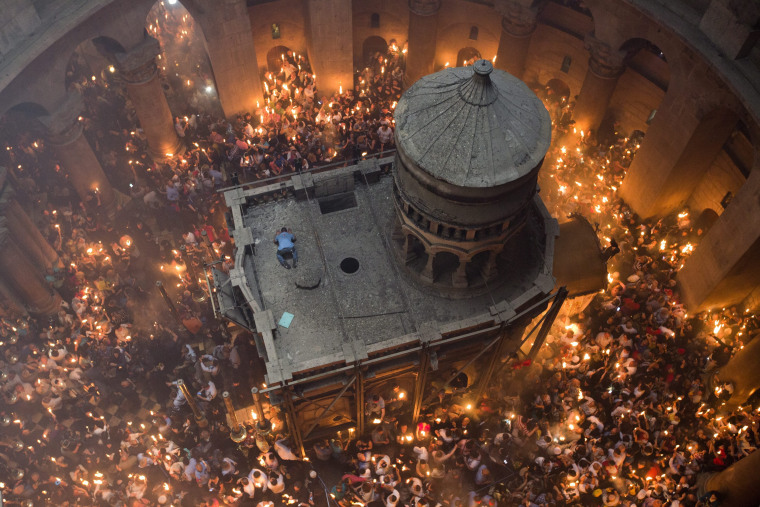
But there is no denying the immense impact the ceremony has on Russian believers. Experts say it highlights both the country's return of faith after the fall of Communism and the tendency of its born-again believers to value rituals and miracles over spirituality.
“This is folk religion. The custom is akin to magic, to paganism,” said Sergei Filatov, a leading expert on religious studies with the Russian Academy of Sciences.
The Holy Fire has been recorded since the 9th century at the Church of the Holy Sepulchre, where Christian tradition holds that Jesus was crucified, buried and resurrected.
It is witnessed only by the Orthodox Patriarch of Jerusalem. The cleric is locked up in a chapel after being stripped of his outer layer of clerical garments and sometimes searched. Believers observe only flashes of blue light inside the room, until the Patriarch emerges with burning candles.
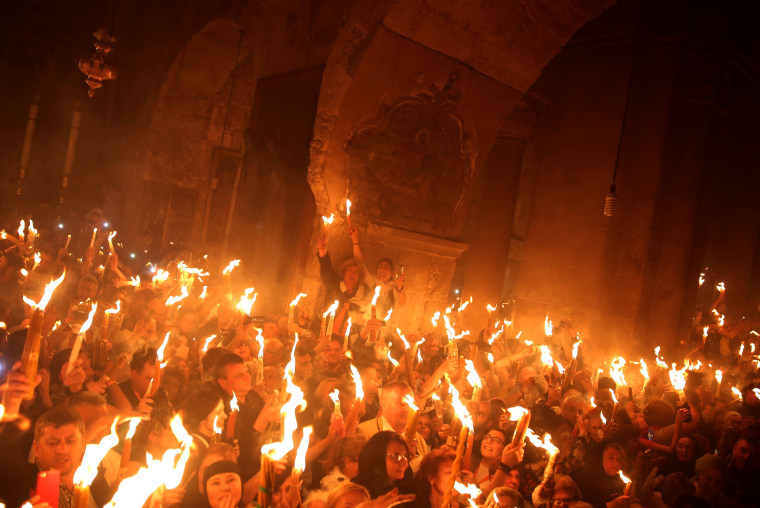
Skeptics are legion — starting with 13-century Pope Grigory IX, who banned Catholics from participating in the ritual. Muslim scholars in the 15th century claimed the fire and blue light were generated by applying igniting balms to sulphur-covered silk threads in the chapel.
“This 'miracle' is a load of hogwash,” said academic Yury Yerofeyev, who sits on the Commission Against Fake Science, the debunking arm of the Russian Academy of Sciences.
Not all agree.
“From a believer point of view, this is definitely a miracle, or at least an inexplicable occurrence,” said Father Andrei Posternak, who is on Russia's delegation which delivered the Holy Fire this year.
Delegation head Vladimir Yakunin was more careful in his comments.
“It's anyone's right whether to believe it or not. But it's an unquestionable thing for believers,” he told NBC News.
There is no shortage of those who believe. When a plane specially carries the flame to Russia in a sealed torch — also used for Olympic flame — it's greeted by thousands of believers at Moscow's Vnukovo airport. (In tsarist times, pilgrims carried the flame by foot or horse, with the journey taking months.)
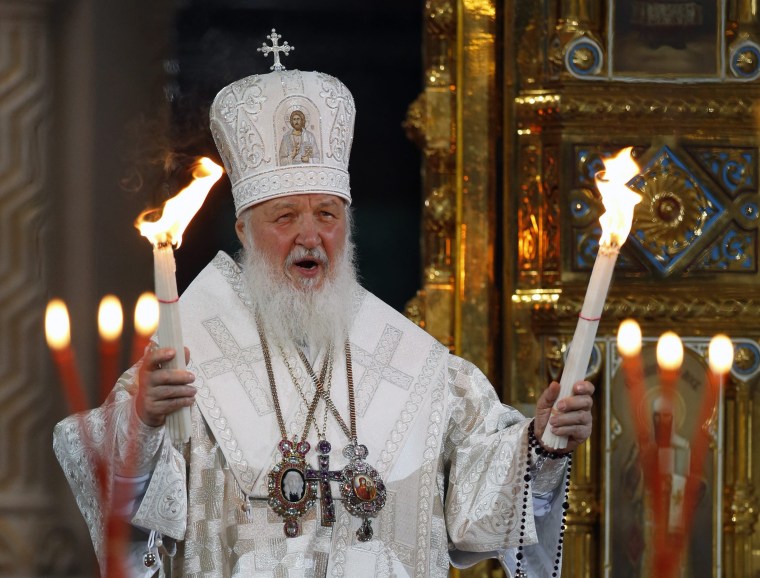
The Holy Fire will this year be flown to 45 cities across Russia. Its arrival was broadcast live online and on a leading national TV channel. It was brought to the Easter service at the country's top Orthodox church — Christ the Savior Cathedral in Moscow — with President Vladimir Putin in attendance.
The delivery is bankrolled by the Andrew the First-Called Foundation, a charity headed by Yakunin — who is a member of Putin's inner circle.
“I came late to religion, and my [spiritual] experience is flawed," the 67-year-old Yukunin said. "But there's an aspiration for the good."
Much of the country can say the same. Russia has only embraced religion since the atheist Soviet Union's fall — the number of self-identified Orthodox Christians in Russia stood at 17 percent in 1989, but went up to 68 percent in 2013, according to independent pollster Levada.
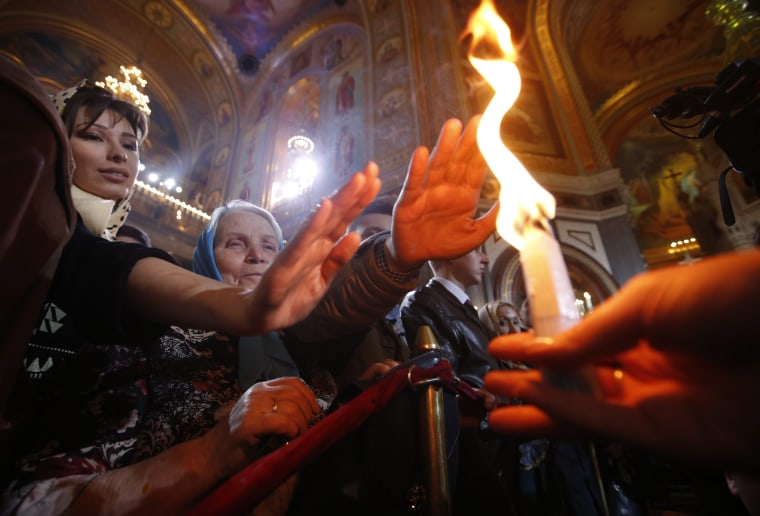
But the depths of their faith is often called into question. Only 14 percent of Russians attend church at least once a month, according to Levada's poll.
“This is ritual worship, and it's increased in recent years,” said Filatov of the Russian Academy of Sciences.
Unlike regular church services, sacral-related occurrences draw crowds in Russia. About 1.6 million came to worship the Gifts of the Magi when they were brought to Russia in 2014, and 3.6 million saw the Holy Girdle in 2011.
“[Over-emphasis on rituals] is an issue,” Yakunin added. “But if it's sincere, it still boosts faith.”
Some experts see an obvious reason for the Russian ardor for the sacred in material form.
“Life is so depressing and turbulent in Russia ... that people want a miracle, a contact with the Kingdom of God,” said Roman Lunkin, an expert with respected sociological research service Sreda.
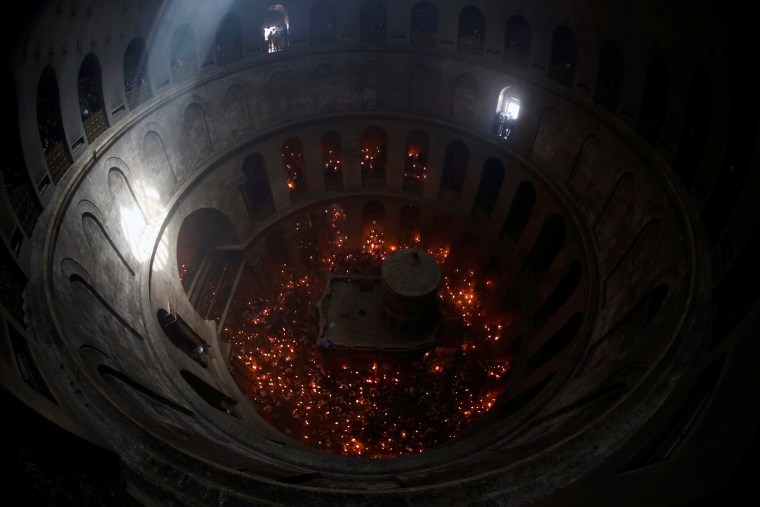
Russia has fallen on hard times since 2013, with the economy plummeting as the Kremlin dabbled in aggressive foreign policies at the expense of domestic development. More than half of the population “expect things to get worse in the future,” state-run pollster VtSIOM said in January.
But whether or not the Holy Fire is a miracle or a ritual, its impact cannot be discarded, Lunkin said.
“Even if the Patriarch of Jerusalem carries a lighter, the Holy Fire has spiritual power,” he added. “A religious feeling can't be destroyed, even by a lighter in a pocket.”